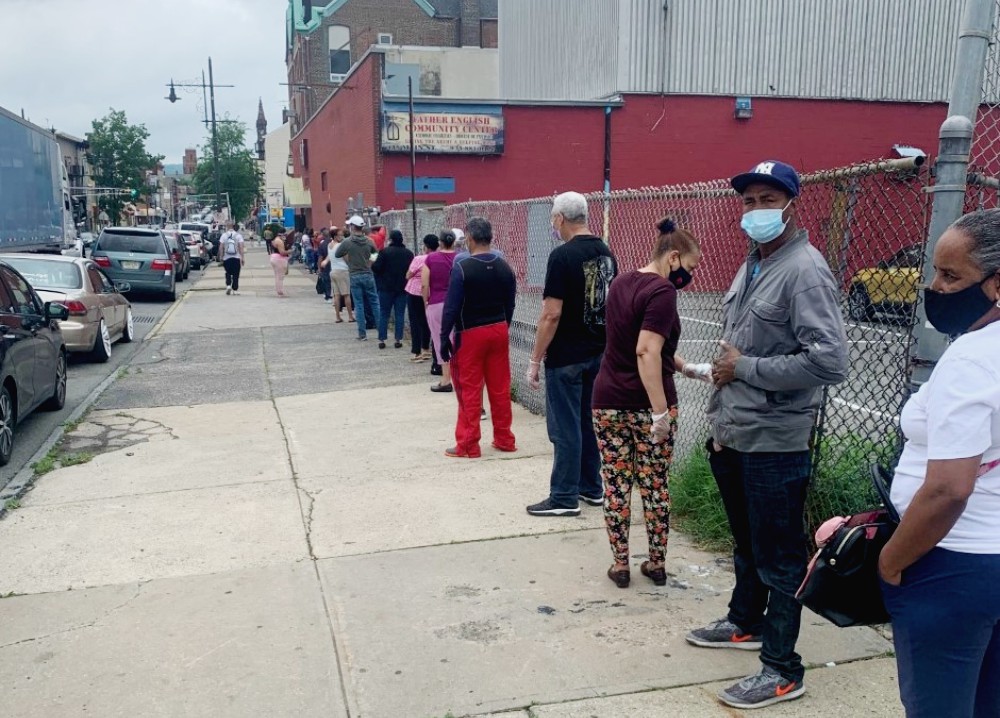
The line outside of the Fr. English Food Pantry in Paterson, New Jersey, stretches through several city blocks June 8 for people seeking food assistance from the program run by Catholic Charities of the Paterson Diocese. (CNS/Courtesy of Catholic Charities Paterson)
At the end of last week, President Donald Trump retreated to his private golf club in New Jersey, where on Saturday he signed four executive actions — of dubious legality and effectiveness — intended to address the economic calamity caused by the coronavirus pandemic that has killed more than 164,000 Americans and cost tens of millions their jobs.
Club members in polo shirts and golf cleats were hastily assembled as a press conference audience. Most were not wearing masks or socially distanced during the gathering, according to reports.
Meanwhile, in cities around the country, Americans wearing masks are standing 6 feet apart — in lines at food pantries. In in Dale City, Virginia, the number of families receiving meat, milk and fresh produce from the food pantry at Holy Family Parish had already more than doubled from March to June. The Arlington Diocese's Catholic Charities programs had seen a 154% increase in food aid and a 288% increase in rental aid since the coronavirus pandemic hit.
And that was before the federal $600 a week in additional unemployment insurance benefits expired on July 31.
Many of those seeking help are first-time clients, folks who already lived paycheck to paycheck before the pandemic. With unemployment over 10% — and projected to stay at record highs until next year — tens of millions of Americans are in danger of being evicted and joining the 200,000 people in America who were homeless even when the economy was booming.
On Aug. 1, the rent was due.
Some renters had been protected by their states' or a federal moratorium on evictions, and the federal stimulus payments and unemployment insurance had been helping people stay current on their bills. Thankfully, too, some generous landlords have restructured rent payments to avoid evictions.
But social service agencies working on the ground are sounding the alarm about an impending eviction crisis, as well as about the numbers and types of people seeking assistance. They are formerly employed, working- and middle-class families, requesting assistance for the first time in their lives. The images are reminiscent of the bread lines during the Great Depression.
Emergency measures to counteract the economic upheaval caused by the coronavirus pandemic — such as the eviction moratorium and the additional unemployment assistance — were part of the original CARES Act, the $2.2 trillion stimulus bill that passed with bipartisan support in March.
That legislation optimistically hoped that we might be moving into a recovery by late summer. Sadly, lack of leadership in addressing the pandemic has led to an explosion in the number of COVID-19 cases. That, in turn, has necessitated a second relief package.
But this time, the politics are anything but bipartisan.
Back in mid-May, the Democratic-controlled House of Representatives passed the HEROES Act, which would provide $3 trillion in aid, plus extend and expand the eviction moratoriums to cover nearly all rental properties in the United States.
The $1 trillion HEALS Act — introduced in the GOP-led Senate in July — does not address eviction protection. The two bills also differ over the issue of state aid, with the GOP bill not including additional aid to states.
Advertisement
Network, the Catholic social justice lobbying group, called the GOP proposal "woefully inadequate," predicting it would lead to a housing crisis, the collapse of Medicaid and a second Great Depression.
"The plan agreed to by Senate Republicans and the White House would take money away from unemployed people in the middle of the worst recession since World War II," a late July statement from Network said. "It would leave Medicaid without needed funding, even though over 70,000 new COVID-19 cases are being diagnosed every day."
Trump's executive actions would postpone payment of the federal payroll tax, offer new unemployment benefits, seek to protect renters and homeowners from eviction, and extend the deferral of payment on federal (but not privately issued) student loans.
Experts interviewed by Catholic News Service said Trump's relief measures are not expected to provide significant relief to people most in need of assistance. In addition, they are limited in scope and may face court challenges.
Meanwhile, most of the U.S. Conference of Catholic Bishops' lobbying has been around the issue of including aid for Catholic schools in any new stimulus bill. Catholic leaders made three pleas in 10 days, encouraging lawmakers to include money for emergency tuition scholarships for low-income families who attend nonpublic schools in any stimulus legislation.
What are Catholics to do?
We get our instructions from Jesus in Matthew 25: Feed the hungry, clothe the naked, care for the sick. The church's charitable organizations have already amped up their services, but private charity cannot handle an economic catastrophe of this level.
Catholic social teaching recognizes that personal charity is not enough, that just societies must be measured by the degree to which they ameliorate the conditions faced by the poor — not by the amount of money they bestow upon the wealthy. Under the leadership of Trump and the inaction of Senate Republicans, our nation is failing the basic standards of justice.
Social safety nets are the concrete embodiment of the moral vision of Matthew 25. Without work, people cannot pay their rent. When they don't pay rent, they end up out on the street. Without shelter, the spiral into deep poverty accelerates.
Even if moral considerations were not part of the equation, basic economics recommend avoiding the falling dominos the Senate and the president are inviting by failing to accede to the more generous provisions in the House-passed bill.
We can't waste time with extraneous debate and partisan politicking. People's lives are at stake.







